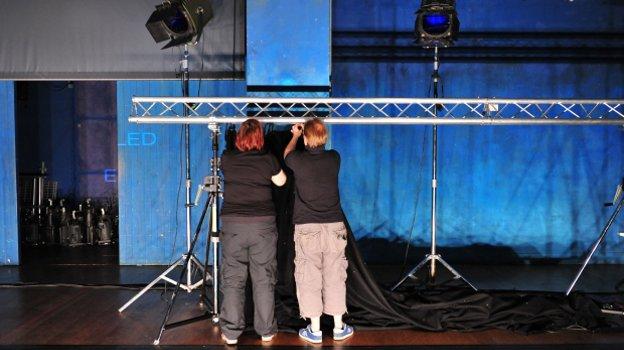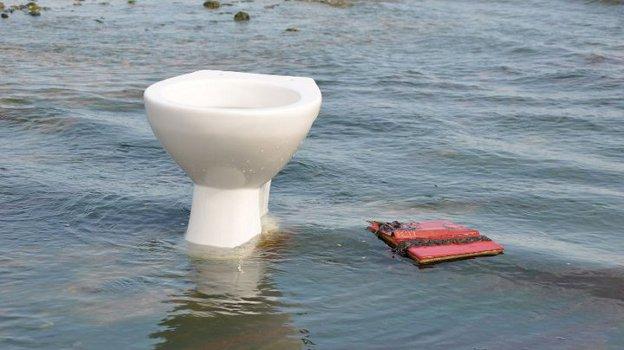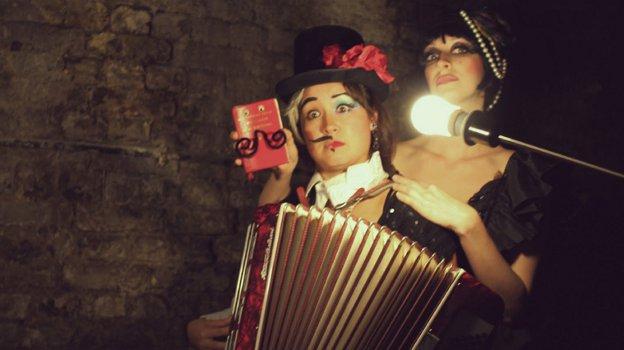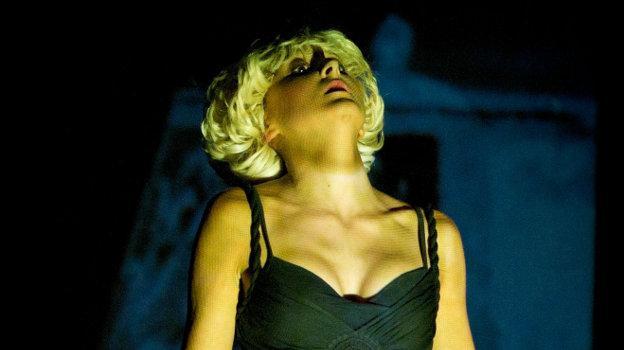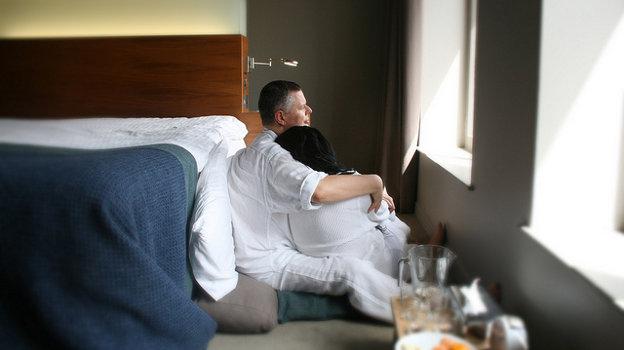
So, where was I? Ah yes, autumn in Edinburgh – although these past few days it’s been almost like summer. There are cricket whites on the Meadows, and hippies blowing giant bubbles – but there’s also a rustling in the trees, and the odd leaf or two falling just as a warning. On the edge of the Meadows is a café with a board outside announcing: ‘Sun? Rain? Hail? Ice Cream!’ Can’t argue with that.
But for some of us, there’s no loitering in the park, it’s off to the theatre – 11am or earlier till 11pm or later, day in, day out. Not that I’m complaining, not really…
I think I reached my lowest point of tiredness and overload on the day I came back to Edinburgh after a long weekend ‘down south’ – having had a few days wearing a completely different hat as dramaturg on Ragroof Theatre’s Gloves On at the National Theatre’s Watch This Space festival, then a late night train back to the Burgh, this all leaving me more tired than I realised.
But I’ve rallied round, and this past week started with three days of fitting in as much as I could see, then a whopping six-hour Total Theatre Awards assessors’ shortlisting meeting on Wednesday eve.
Of course I can’t divulge what was said, only that it is a painful process; a democratic process involving twenty people inside the room, plus other outside advisers, and of course there are always personal favourites that don’t make it through…
The ‘ones that got away’ for me this year include Blind Summit’s The Table,Free Time Radical by Frequency D’Ici, Tim Crouch’s I Malvolio, Il Pixel Rosso’s And The Birds Fell From The Sky, New Art Club, and The Two Wrongies. Great shows from all of the above – so I would heartily recommend them, even though they didn’t make the shortlist. I also loved TEAM’s Mission Drift, and Dance Marathon, both of which closed early so couldn’t be judged.
So, that’s what’s not on the shortlist – what did make it through? It is a very interesting mix, reflecting the diversity of work that Total Theatre supports. There are just three categories: Emerging, Innovation, and Physical/Visual & Devised. Under Work by Emerging Artists/Companies there are two shows inspired by ‘feminist’ fairytales (Bluebeard and The Girl With Iron Claws) which take very different approaches to the telling, one with a vaudeville vibe and one in more traditional storytelling mode, but both using music and object animation in interesting ways; a quirky cabaret show (East End Cabaret); a devised piece set in a toilet, Sailing On, which I haven’t yet seen; and a gorgeous solo live art performance/multimedia piece, As the flames rose we danced to the sirens, the sirens (winner of best show at BE festival).
Under Physical/Visual & Devised Theatre, there are a good few circus or circus-theatre shows: a one-man equilibrist-meets-multimedia show, Leo; Circ La Putyka from the Czech Republic; and two shows from Scottish artists,Uncharted Waters, and Snails and Ketchup. Then, there’s a classic (and perfectly executed) ‘total theatre’ show by Told By An Idiot, The Dark Philosophers; a wild Kantor-esque music/visual theatre extravaganza that won my heart, Turandot; a completely different approach to the point where music meets theatre by site-specific gurus Grid Iron, What Remains which is a one-man piece by the company’s longterm associate, composer David Paul Jones; a beautifully crafted wordless mask theatre piece by Lecoq-trained Theatre Ad Infinitum, Translunar Paradise; and expert shadow puppetry from Canadian company Bunk Puppets in Swamp Juice. Also in the running are: a comedy dance show, The Ballet Ruse; a clown-comedy crossover, Dr Brown Decaves; and something that almost defies description – The Technodelic Comedy Show, a Japanese mime/animation played as a kind of live computer game, to give you some idea.
Over in Innovation, there’s a whole load of shows that are questioning the traditional definitions of theatre, pushing boundaries, and/or challenging form. These include the notorious Audience by Ontroerend Goed, which has managed to keep Edinburgh chattering for the past two weeks; and the overnight sensation, in both senses of that term, Hotel Medea. There are two pieces from artists based in, or heralding from, the Middle East – and both, in very different ways, question notions of personal freedom taken for granted in the West. White Rabbit, Red Rabbit is a play written for an actor who has not yet seen the script, and an audience invited to join the game; Maybe If You Choreograph Me… is intended for an audience of one – and is ‘for men only’.May I Have the Pleasure…? is the latest from the master of interactive theatre, Adrian Howells, who invites his audience to join him at a wedding reception;You Once Said Yes is interactive in a very different way, played out on the streets of Edinburgh (and sold out; I am still trying to get a ticket!). Also in this group are Orkestra del Sol’s Top Trumps, live music with a twist, and The Adventures of Alvin Sputnik, a very sweet solo show featuring puppetry and animation.
Additional to this rather long shortlist are some shows that opened late, and come highly recommended by members of the judging or advisory panels, so are also being considered for an Award. Working the Devil by Dog Kennel Hill Project will be considered in the Physical/Visual & Devised category. Then there are a whole swathe of extras under Innovation: The Animals and Children Took to the Streets by 1927 (previously seen by Total Theatre Magazine at BAC, a gorgeous interweaving of live action and animation); Quarantine’s Entitled; every minute, always by Melanie Wilson and Abigail Conway; The first moment I saw you I knew I could love you by Curious (a very clever and beautiful reflection on memory, ageing, and our relationship to our bodies and our health/sanity); 3rd Ring Out – The Emergency by Metis Arts (a global warming SF game played out in a shipping container); andWatch Me Fall by Action Hero.
Looking at the above lists, there are definitely some patterns to notice and comment on. The first is just how many of the shows above are being presented at Edinburgh’s brand new venue Summerhall, which has emerged as the epicentre of all things experimental. The Hotel Medea overnighter is played out here, as is As The Flames Rose…, as well as most of the ‘late additions’ above (opening shows in Edinburgh later because it is a British Council Showcase year, which means that a lot of the world’s bookers and producers are in town for the last week only). Summerhall is an artist-led venture, supported by both Battersea Arts Centre and the Demarco European Art Foundation, and is certainly the must-go venue of the 2011 Fringe. There is talk of Summerhall being made into a year-round artist-led centre for residencies and performances, but that is just speculation at the moment. If I learn more, I’ll report back.
Other venues or producing houses with two or more shortlisted shows are: Universal Arts at New Town Theatre; Remarkable Arts at St George’s West; Dancebase; Traverse Theatre; Zoo Venues; Underbelly; and Pleasance. Forest Fringe, Laughing Horse Free Fringe, C Venues, and Assembly at George Square come in with one each.
Other patterns? Lots of interactive/immersive work of all sorts on the Innovation shortlist, which reflects the trend in contemporary performance; the high number of circus shows on the Physical/Devised shortlist symptomatic of this as a growing artform; lots of puppetry and animation either shortlisted or seriously considered for shortlist; numerous shows that are sited outside of regular theatre spaces; a lot of work using spoken word in interesting ways (mediated and otherwise); a continuing interest in deconstructing classic fairytales witnessed in the shortlist and in numerous other shows considered for the Awards; a number of shows investigating flooding due to global warming; and many shows manifesting an interesting use of music, and/or with narratives driven by music.
So, there you have it: the shortlist. I’ve set myself the task of seeing all the shows on the list before the judging meeting on Thursday 25th – wish me luck!

